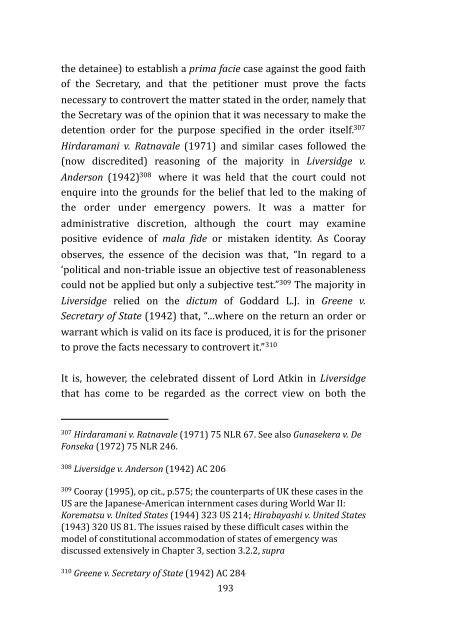States of Emergency - Centre for Policy Alternatives
States of Emergency - Centre for Policy Alternatives
States of Emergency - Centre for Policy Alternatives
You also want an ePaper? Increase the reach of your titles
YUMPU automatically turns print PDFs into web optimized ePapers that Google loves.
the detainee) to establish a prima facie case against the good faith<br />
<strong>of</strong> the Secretary, and that the petitioner must prove the facts<br />
necessary to controvert the matter stated in the order, namely that<br />
the Secretary was <strong>of</strong> the opinion that it was necessary to make the<br />
detention order <strong>for</strong> the purpose speciLied in the order itself. 307<br />
Hirdaramani v. Ratnavale (1971) and similar cases followed the<br />
(now discredited) reasoning <strong>of</strong> the majority in Liversidge v. <br />
Anderson (1942) 308 where it was held that the court could not<br />
enquire into the grounds <strong>for</strong> the belief that led to the making <strong>of</strong><br />
the order under emergency powers. It was a matter <strong>for</strong><br />
administrative discretion, although the court may examine<br />
positive evidence <strong>of</strong> mala Kide or mistaken identity. As Cooray<br />
observes, the essence <strong>of</strong> the decision was that, “In regard to a<br />
‘political and non‐triable issue an objective test <strong>of</strong> reasonableness<br />
could not be applied but only a subjective test.” 309 The majority in<br />
Liversidge relied on the dictum <strong>of</strong> Goddard L.J. in Greene v. <br />
Secretary <strong>of</strong> State (1942) that, “…where on the return an order or<br />
warrant which is valid on its face is produced, it is <strong>for</strong> the prisoner<br />
to prove the facts necessary to controvert it.” 310<br />
It is, however, the celebrated dissent <strong>of</strong> Lord Atkin in Liversidge <br />
that has come to be regarded as the correct view on both the<br />
307<br />
Hirdaramani v. Ratnavale (1971) 75 NLR 67. See also Gunasekera v. De <br />
Fonseka (1972) 75 NLR 246.<br />
308<br />
Liversidge v. Anderson (1942) AC 206<br />
309<br />
Cooray (1995), op cit., p.575; the counterparts <strong>of</strong> UK these cases in the<br />
US are the Japanese‐American internment cases during World War II:<br />
Korematsu v. United <strong>States</strong> (1944) 323 US 214; Hirabayashi v. United <strong>States</strong> <br />
(1943) 320 US 81. The issues raised by these difLicult cases within the<br />
model <strong>of</strong> constitutional accommodation <strong>of</strong> states <strong>of</strong> emergency was<br />
discussed extensively in Chapter 3, section 3.2.2, supra<br />
310<br />
Greene v. Secretary <strong>of</strong> State (1942) AC 284<br />
193











